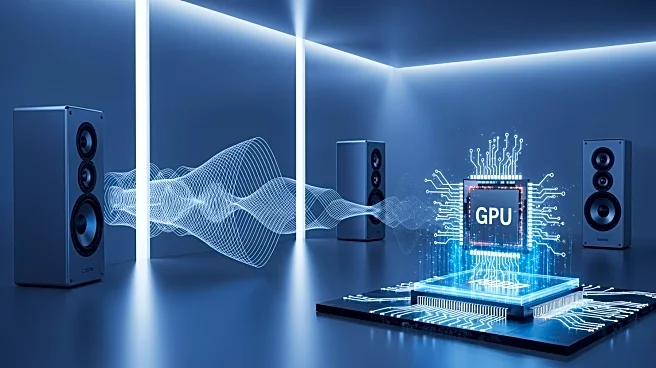What's Happening?
Researchers at NTT Laboratories in Japan have developed a groundbreaking spatial active noise cancellation (ANC) technology that utilizes a GPU to reduce noise across entire rooms. This new system, described
as the 'world's first spatial ANC technology,' significantly enhances the speed and effectiveness of noise cancellation compared to traditional ANC systems found in headphones. By employing a general-purpose GPU (GPGPU), the technology processes sound reflections and variable noises in approximately two microseconds, allowing it to target complex noise environments such as vehicle cabins and conference rooms. NTT plans to implement this technology commercially within a year, potentially transforming environments like airports and hotels into quieter spaces.
Why It's Important?
The introduction of spatial ANC technology represents a significant advancement in noise reduction capabilities, offering potential benefits across various sectors. For industries such as transportation and hospitality, this technology could improve customer experiences by creating quieter environments, thereby enhancing comfort and satisfaction. Additionally, the technology's ability to reduce urban traffic noise and improve quality of life highlights its potential societal impact. As noise pollution continues to be a concern in densely populated areas, spatial ANC could play a crucial role in mitigating its effects, contributing to better public health outcomes.
What's Next?
NTT Laboratories anticipates commercial implementation of its spatial ANC technology within a year. This development may prompt interest and investment from industries seeking to enhance their noise management solutions. Stakeholders such as transportation companies, hospitality businesses, and urban planners might explore partnerships or adoption strategies to leverage this technology for improved customer experiences and environmental benefits. As the technology becomes more widely available, it could also inspire further research and innovation in noise cancellation systems.
Beyond the Headlines
The ethical implications of spatial ANC technology include considerations around privacy and surveillance, as the technology's ability to control sound environments could be used in ways that impact personal privacy. Additionally, the widespread adoption of such technology may lead to cultural shifts in how public spaces are designed and utilized, potentially influencing social interactions and community dynamics.












